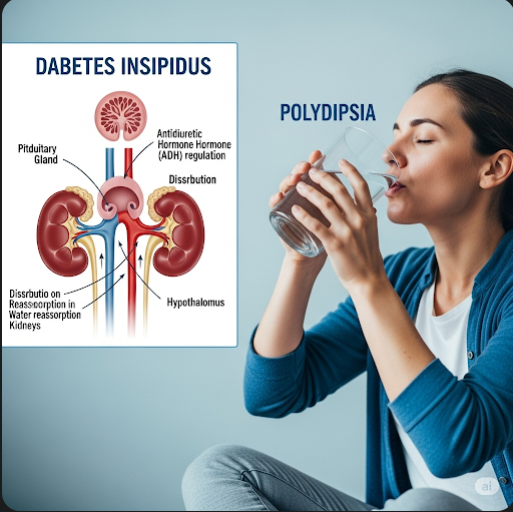Overview
Polydipsia is the medical term for excessive or abnormal thirst, typically associated with excessive fluid intake. It is often a symptom of an underlying health condition rather than a disease itself. Polydipsia is commonly linked to diabetes mellitus, diabetes insipidus, psychological disorders, or certain medications. While occasional thirst is normal, persistent or unquenchable thirst may indicate a serious metabolic or hormonal imbalance.
What is Polydipsia?
Polydipsia is characterized by a persistent sensation of dry mouth or thirst, resulting in increased fluid consumption, often exceeding 3–4 liters per day. It is often part of a group of symptoms, including:
- Polyuria (frequent urination)
- Polyphagia (excessive hunger) – especially in diabetes mellitus
Polydipsia can be physiologic (due to dehydration or exercise) or pathologic (due to medical or psychological causes). Identifying and addressing the underlying cause is essential for effective treatment.
Symptoms
The main symptom of polydipsia is constant or frequent thirst, even after drinking fluids. Associated symptoms may include:
- Dry mouth or throat
- Frequent urination (especially at night)
- Fatigue
- Blurred vision
- Weight loss (in diabetes)
- Persistent hunger
- Nausea or dizziness (in severe cases of dehydration or electrolyte imbalance)
In psychiatric causes, the person may drink water compulsively, far beyond physiological needs.
Causes
Polydipsia can be caused by various medical, physiological, or psychological conditions, including:
1. Diabetes Mellitus
- High blood sugar levels cause the kidneys to excrete more water, leading to dehydration and increased thirst.
2. Diabetes Insipidus
- A rare condition where the body cannot properly regulate water balance due to a deficiency or resistance to antidiuretic hormone (ADH).
3. Dehydration
- From heat, fever, vomiting, diarrhea, or excessive sweating.
4. Medication Side Effects
- Diuretics, anticholinergics, and certain psychiatric drugs can increase fluid loss or dry mouth.
5. Psychogenic Polydipsia
- Excessive water intake associated with mental health disorders, especially schizophrenia.
6. Chronic Kidney Disease
- Impaired kidney function can disrupt fluid and electrolyte regulation.
7. High Salt or Protein Intake
- May increase thirst as the body tries to balance sodium or urea levels.
Risk Factors
Factors that can increase the risk of developing polydipsia include:
- Uncontrolled diabetes
- Certain psychiatric disorders
- Prolonged exposure to hot weather
- Intensive physical activity
- Use of diuretics or laxatives
- Chronic illnesses affecting the kidneys or endocrine system
Complications
If left untreated, the underlying causes of polydipsia can lead to severe health consequences:
- Electrolyte imbalances (especially sodium)
- Water intoxication or hyponatremia from overhydration
- Kidney damage due to prolonged diabetes or dehydration
- Neurological symptoms (confusion, seizures) in severe cases
- Worsening of mental health disorders
In cases like psychogenic polydipsia, the excess water intake can become dangerous and even life-threatening.
Prevention
Prevention of polydipsia involves managing the root causes and maintaining overall hydration balance:
- Control blood sugar in diabetes
- Avoid overuse of diuretics or laxatives
- Drink water according to body needs, especially during physical activity
- Manage underlying psychiatric conditions with professional help
- Regular check-ups for kidney and endocrine function if at risk
- Monitor urine output and thirst in people with chronic conditions
Treatment Options in Korea
South Korea provides high-quality, multidisciplinary care for patients with symptoms like polydipsia, focusing on diagnosis, cause identification, and individualized treatment.
1. Diagnostic Evaluation
- Blood glucose test: To rule out or confirm diabetes
- Electrolyte and kidney function tests: To evaluate dehydration, sodium levels, and renal health
- Urine tests: Including osmolality and volume to check for diabetes insipidus
- Water deprivation test: To distinguish psychogenic polydipsia from diabetes insipidus
- Psychiatric evaluation: For suspected psychogenic causes
2. Medical Management
- Insulin or oral antidiabetics: For diabetes mellitus
- Desmopressin (DDAVP): For central diabetes insipidus
- Diuretics or thiazides: For nephrogenic diabetes insipidus (in some cases)
- Medication adjustment: If thirst is a drug side effect
- Behavioral therapy: For psychogenic polydipsia
3. Lifestyle & Supportive Care
- Hydration management: Tailored to individual needs
- Dietary counseling: To reduce salt and sugar intake
- Psychological counseling: Cognitive behavioral therapy for mental health support
4. Best Hospitals in Korea
Leading hospitals such as Seoul National University Hospital, Samsung Medical Center, Asan Medical Center, and Severance Hospital offer:
- Endocrinology, nephrology, and psychiatry departments
- Advanced diagnostic labs for hormonal and metabolic conditions
- English-speaking international patient care services
- Ongoing management for chronic causes of excessive thirst













